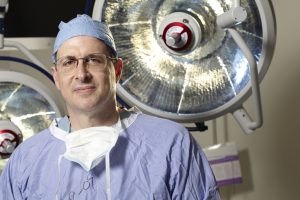Party With A Purpose Joins With AACR Foundation to Honor Surgeon, Support Research
Philadelphia’s cause-driven gala Party With A Purpose has selected the American Association for Cancer Research (AACR) as its beneficiary, with a goal of raising funds for pancreatic cancer research on Sunday, Sept. 18.
Jeffrey Drebin, MD, PhD, chair of the Department of Surgery at the Perelman School of Medicine at the University of Pennsylvania and past president of the Philadelphia Academy of Surgery, will be presented with the inaugural AACR Foundation/Party With A Purpose Scientific Leadership Award for Pancreatic Cancer as his work has contributed significantly to understanding the genetic origins of cancer, and continues to identify new approaches to eradicate cancer. Drebin will then award a scientific grant to early-career investigator Major Kenneth Lee, IV, MD, PhD, an assistant professor of surgery at Penn Medicine, who is dedicated to researching pancreatic cancer.
In a recent interview, Drebin shared his perspective on surgery to treat patients with pancreatic cancer, including a promising new approach to detecting pancreatic cancer during surgery.
Q: When someone thinks of a surgeon, they would not necessarily think of them as a cancer researcher. Was it always your goal to combine the two disciplines or was there an experience in your career that led you to this?
A: I have always been interested in taking care of people with cancer in part because I have lost so many family members to this disease. As I trained to become a doctor and participated in my clinical rotations in medical school, and observed the role of the surgeon and how they interacted with the medical oncologists, the surgical bug bit me. Surgery is often part of treatment for patients with solid tumor malignancies, along with chemotherapy and radiation. And in fact, most patients who are cured of solid-tumor cancers are cured because of surgery, in many cases in conjunction with radiation therapy and/or chemotherapy.
Q: How did you choose to focus on pancreatic cancer research?
A: When I was beginning my training, pancreas surgery was still extremely risky and dangerous. We were just learning how to do it well and safely. And unlike many other cancers, which if caught early can be cured with surgery alone, pancreas cancer is still a very aggressive tumor. For me, pancreas cancer really combined a surgical challenge from a technical point of view, and recognition that good surgery alone wasn’t enough. We needed to improve our understanding of cancer biology and improve approaches to treatment. This goal fit very well with my interests in being a cancer doctor but also a cancer researcher.
Q: Can you tell us about the advanced imaging technology you’ve been using at Penn to better detect pancreatic cancer cells during surgery?
A: At Penn Medicine, we’ve created a Center for Precision Surgery that looks at the question of how we do surgery with a better understanding of what’s cancer and what’s normal tissue.
Traditionally, surgeons have had to use their eyes and sense of touch to define normal tissue versus cancerous tissue. Pancreas cancer is a particularly challenging tumor because it grows around a number of structures that can’t be removed. Getting at every last bit of the cancer, while not damaging surrounding structures, is a major technical challenge for surgeons.
In our Center for Precision Surgery program, we are taking advantage of new technologies using nanotechnology and receptor guided fluorescence, giving patients medications before surgery that will make their tumors glow when put under the appropriate light in the operating room. The idea is to explore whether we can better define margins between normal and cancer cells, identify small deposits of cancer cells located away from the main tumor that would be responsible for recurrence, and do a better job of identifying lymph nodes that have tumor involvement with the goal of removing all of these cancer cells that are currently undetected by the naked eye or touch.
A special [imaging] camera emits light of a particular wavelength, which can be used with a laparoscope or during open surgery, then projects an image onto a screen that shows fluorescence wherever there is cancer tissue that has taken up this imaging agent. It is like turning off the lights and watching a fluorescent poster glow in the dark. The idea is to make the cancer cells glow while we are looking at the open incision in the operating room to identify cancer cells that we were unable to see with our naked eye.
This program is led by Penn Medicine thoracic surgeon Sunil Singhal, MD, associate professor of surgery, who has pioneered this technique in lung cancer. This technology is also being used during some surgeries to remove brain tumors and urologic cancers. We are early in this clinical research trial for pancreas cancer with several patients who have participated. We are constantly testing a first generation agent, and we will continue to explore which imaging agent will best be taken up by pancreas cancer cells, as these cancer cells have different receptors than those in lung or brain cancer. This research using advanced technology and improvements in biology has potential to improve our ability to eradicate cancer in the operating room.
Q: How will funding from the AACR Foundation and Party With A Purpose support your efforts to advance this research?
A: We are receiving $50,000 to help support this research, which is being led by one of our young pancreas surgeons, Major Kenneth Lee IV, MD, PhD, Penn Medicine assistant professor of surgery, along with Dr. Singhal. The funds from the AACR Foundation/Party With A Purpose Award will be used to help pay for the research costs. Patients are not charged to participate in any research studies. The research costs are supported by funds from organizations like the American Association for Cancer Research. Having this source of funding is a great way to speed knowledge and hopefully improve treatment.
Q: Why was Dr. Lee selected? How important is it to support early-career investigators?
A: Dr. Lee is a remarkable surgeon-scientist, and I am very proud of him. This kind of support is a great step in advancing his ability to do good quality research. The current funding landscape is very difficult. It is a vicious cycle. Grant funds tend to go to people who have a track record. A young researcher needs funding to do the work, but they don’t yet have the track record. These awards for early investigators are very critical.
 Q: Can you share some personal thoughts on being the inaugural recipient of the AACR Foundation/Party With a Purpose Scientific Achievement Award?
Q: Can you share some personal thoughts on being the inaugural recipient of the AACR Foundation/Party With a Purpose Scientific Achievement Award?
A: It is a tremendous honor. The American Association for Cancer Research is a great organization that does so very much for cancer research, ranging from publication of a number of the leading cancer research journals, to awarding grants for research, and also helping to administer grants from large funding organizations like Stand Up To Cancer. AACR is absolutely at the top of cancer research organizations, and to be honored and recognized by them is certainly one of the highlights of my career.
Party With A Purpose occurs on Sunday, Sept. 18, 2016, at the Union League in Philadelphia. Learn more about Party With A Purpose. Tickets are available here.




